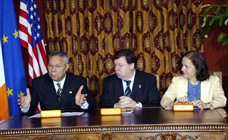International Cooperation

The U.S. Government has engaged a number of other countries and international organizations in cooperative activities related to space-based PNT. In many cases, such cooperation is intended to ensure compatibility and interoperability between GPS and other space-based PNT systems. The cooperation is also intended to protect national security interests and maintain a level playing field in the global market for space-based PNT goods and services. The United States also participates in many activities intended to promote U.S. space-based PNT technology as an international standard for safe transportation, seamless navigation, and sustainable development.
Highlights of this international cooperation include ongoing U.S. efforts with Australia, Europe, India, Japan, Russia, and international organizations. These efforts are coordinated within the U.S. Government through the GPS International Working Group.
Australia

The United States and Australia initiated a cooperative relationship on GPS and space-based PNT through a Joint Delegation Statement signed in 2007. The cooperation expands upon existing efforts to ensure interoperability between GPS and Australia's Ground-based Regional Augmentation System (GRAS) and Ground Based Augmentation System (GBAS).
Key Documents:
Europe

The United States and the European Union and its member states have been close partners in the area of space-based PNT since 2004, when the two parties signed a historic agreement establishing cooperation related to GPS and Europe's planned Galileo system. The cooperation aims to ensure that GPS and Galileo will be interoperable at the user level for the benefit of civil users around the world. The cooperation is also intended to maintain a level playing field in the global market for goods and services related to space-based PNT.

The GPS-Galileo Agreement established four working groups for cooperation on:
- Radio frequency compatibility and interoperability;
- Trade and civil applications;
- Design and development of the next generation of systems; and
- Security issues related to GPS and Galileo.
Key Documents:
- GPS-Galileo Agreement (establishing cooperation), June 2004
- White House Fact Sheet on GPS-Galileo Agreement, June 2004
- Remarks of Secretary of State on GPS-Galileo Agreement, June 2004
- Joint Statement (signal optimization), Mar 2006
- Joint Statement (Working Group B), Jan 2007
- Joint Fact Sheet on GPS and Galileo, Mar 2007
- Joint Press Release on Common Civil Signal Design, Jul 2007
- GPS-Galileo Working Group B Meeting Summary, Jul 2008
- Joint Statement (first plenary meeting), Oct 2008
India

The United States and India issued a Joint Statement in 2007 establishing cooperation on GPS and space-based PNT. The cooperation expands upon existing efforts to ensure interoperability between GPS and India's GPS And GEO-Augmented Navigation (GAGAN) system.
Key Documents:
Japan

The United States and Japan have enjoyed a successful relationship on space-based PNT since 1998, when the heads of both nations signed a Joint Statement establishing cooperation in the use of GPS. Through this relationship, the two nations have achieved interoperability between GPS and Japan's MTSAT-based Satellite Augmentation System (MSAS), a geostationary satellite similar to the U.S. Wide Area Augmentation System (WAAS). The nations have also taken steps to ensure interoperability between the next-generation GPS constellation and Japan's planned Quasi-Zenith Satellite System (QZSS), a regional satellite constellation that will complement GPS over East Asia.
Key Documents:
- Joint Statement (establishing cooperation), Sept 1998
- Joint Announcement (first plenary meeting), Feb 2001
- Joint Announcement (initiating GPS/QZSS cooperation), Oct 2002
- Joint Statement, Nov 2004
- Joint Announcement (GPS/QZSS interoperability), Jan 2006
- Joint Announcement, May 2007
- Joint Announcement (noting QZSS sites in Hawaii and Guam), Nov 2008
Russia

The United States and Russia initiated cooperation in 2004, with the primary goal of enabling civil interoperability at the user level between GPS and Russia's GLONASS system. Two working groups have been established to address: (1) radio frequency compatibility and interoperability for enhanced PNT; and (2) technical interoperability between the search-and-rescue capabilities planned for GPS and GLONASS.
Key Documents:
International Organizations

The United States is a charter member of the International Committee on Global Navigation Satellite Systems (ICG), established in 2005 through the United Nations Office of Outer Space Affairs. The ICG is intended to promote worldwide applications of space-based PNT technology, particularly in developing nations. The United States is a key member of the ICG Providers Forum, a venue for multilateral interaction among the world's providers of space-based PNT services.
Key Documents:
- ICG Terms of Reference, Nov 2006
- ICG Work Plan, Nov 2006
- Press Release (first meeting), Nov 2006
- Joint Statement (second meeting), Sep 2007
- Providers Forum Report (first meeting), Sep 2007
The United States also works on international space-based PNT issues through other multilateral bodies, including the International Civil Aviation Organization (ICAO), International Maritime Organization (IMO), International Telecommunication Union (ITU), World Trade Organization (WTO), Asia-Pacific Economic Cooperation (APEC), and North Atlantic Treaty Organization (NATO).
Key Documents:

